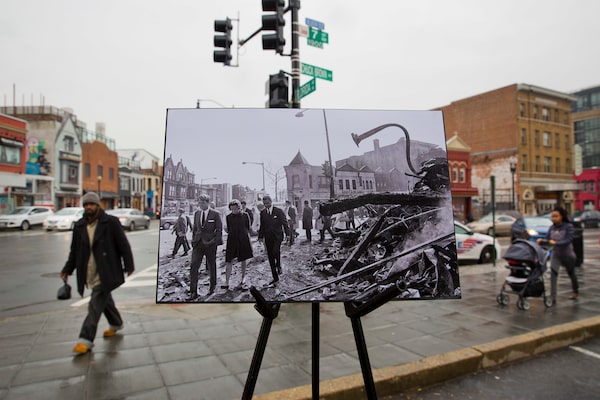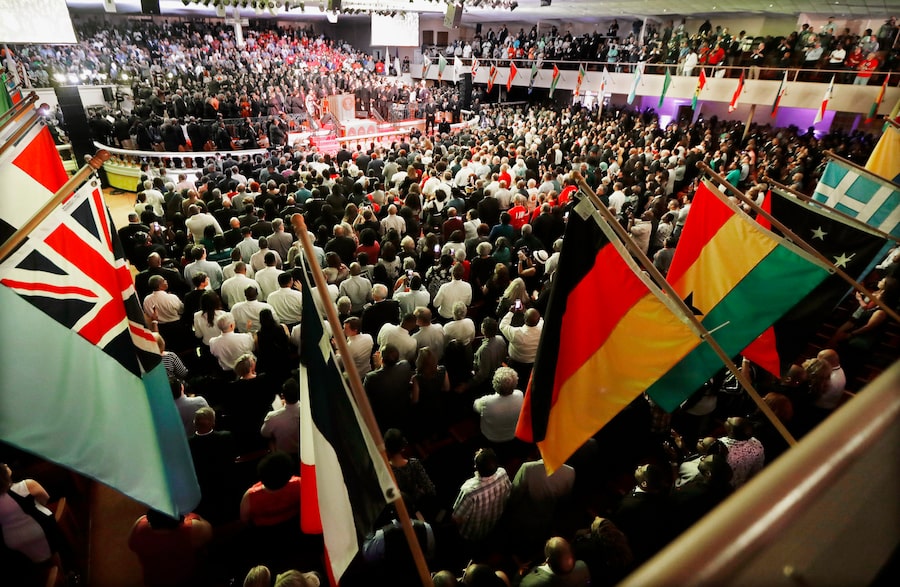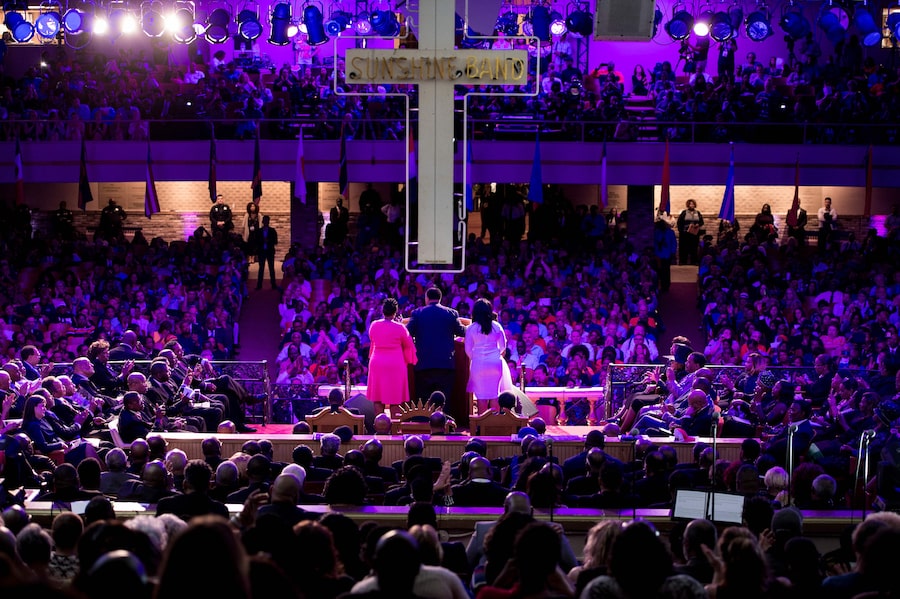
Martin Luther King Jr. addresses thousands who gathered at the Lincoln Memorial on August of 1963. This print from the Globe and Mail archives shows the photo editor’s mark up and an overlay for the suggested crop. Five years after the photo was taken, on April 3, 1968, Dr. King delivered his famous 'Mountaintop' speech in Memphis and was assassinated a day later.Associated Press/Globe archives
David Shribman is executive editor of the Pittsburgh Post-Gazette and a former Washington-based national political correspondent for The Wall Street Journal.
It was a time of great turmoil, when, as the Rev. Martin Luther King Jr. put it in what became his last speech, “the world is all messed up.” It was a time of great introspection, when, as Senator Robert F. Kennedy put it in a speech the evening of Mr. King’s death, “we have to make an effort to understand, to go beyond these rather difficult times.”
It was a time of great urgency, and yet, in that period before social media, Mr. Kennedy found himself in an awkward position of announcing the death of Mr. King to a group of African-Americans in Indianapolis, Ind., who were unaware of what had happened hours earlier in Memphis, Tenn. It was a time of unspeakable tragedy and yet, the speeches that were delivered by these two men that day – and, more broadly, in a remarkable 17-day period leading to the King assassination – are among the greatest in American history, speeches that gave voice to the combustible mixture of hope and horror of early Spring, 1968, and that spawn inspiration still a half-century on.
It was also the beginning of a period in which Americans began to distrust their presidents to a degree that had few precedents. The skepticism and hostility that would later greet Richard M. Nixon (who was nearly impeached for Watergate), Bill Clinton (who was impeached in the episode involving his affair with a White House intern) and Donald J. Trump (whose remarks are studded with untruths) began with Lyndon B. Johnson, the Vietnam War-era President for whom the phrase “credibility gap” was invented.
It was Mr. Johnson’s lack of candour that prompted Mr. Kennedy, at a campaign speech at the University of Kansas nearly three weeks before the King assassination, to deliver these words:
“This country needs honesty and candour in its political life and from the President of the United States.”
The United States and much of the world is marking the 50th anniversary of the especially fraught year of 1968, with its twin assassinations of inspiring leaders, turmoil on campuses worldwide, insurrections in Paris and Berlin, and the creation of the Parti Québécois and the selection of René Lévesque as its inaugural leader.
But all these half-century commemorations also underline the great changes that have occurred in that period, perhaps chief among them the ascendancy of the tweet and the death of grace in rhetoric, particularly in the United States, where this week vital policy on immigration was made in a medium that accommodates 280 characters, although with less elegance than Mr. Kennedy applied when, in 66 off-the-cuff characters, he urged the shocked, nearly all-black crowd at 17th and Broadway in Indianapolis to adopt as their goal “to tame the savageness of man and make gentle the life of this world.”
“There’s a classical idea of oratory that takes the notion of ‘opportunity’ incredibly seriously,” says Christopher Warren, a Carnegie Mellon University specialist in Elizabethan literature. “An orator who is able to say precisely the right thing at the precisely the right moment is the ideal orator. Shakespeare’s characters were especially good at understanding the moment. The capacity to read the moment is an indispensable part of Shakespeare’s gift, and also of Kennedy’s and King’s.“
Both the King valedictory address and the Kennedy memorial remarks were improvised speeches, both men – like hurricanes gathering force from the roiling atmosphere surrounding them – taking energy from their audiences, both men counselling and consoling their listeners.
Mr. King’s remarks, just before he was shot on the second floor of the Lorraine Motel, are remembered for his eerie farewell (“I’ve seen the Promised Land. I may not get there with you”). But, like so many landmark speeches – Abraham Lincoln’s Gettysburg Address of 1863, John F. Kennedy’s inaugural address almost a century later, in 1961 – Mr. King’s address is a rich tapestry of soaring rhetoric:
“The nation is sick. Trouble is in the land; confusion all around. That’s a strange statement. But I know, somehow, that only when it is dark enough can you see the stars. And I see God working in this period of the twentieth century in a way that men, in some strange way, are responding.”
Mr. Kennedy responded to the King death with unusual sentiment and instinct. “Here were the two forces that were so important to him – tragedy and civil rights – all in one in one episode,’’ said David Eisenhower, who was Dwight Eisenhower’s grandson and Mr. Nixon’s son-in law and who teaches a course on great speeches at the University of Pennsylvania. ”It was a natural moment for him, and he captured that moment.“
Mr. Kennedy‘s remarks were an appeal for unity rather than division that would be incongruous in America’s current political environment, in which politicians on both the left and right appeal to their bases and create nearly a vacuum at the centre:
“What we need in the United States is not division; what we need in the United States is not hatred; what we need in the United States is not violence or lawlessness; but love and wisdom, and compassion toward one another, and a feeling of justice toward those who still suffer within our country, whether they be white or they be black.”
Together, these speeches both reflected the tone of their times and, in doing so, helped set the timbre of their times. And in a way they are appropriate to our own time, not as nostalgia-tinged period pieces but rather as north stars for our own passage. They speak to us, still, much in the way that Leonard Cohen proclaimed in Tower of Song: “You’ll be hearing from me, baby, long after I’m gone.”
Listen, for example, to this excerpt from Mr. King’s Memphis speech:
“We have been forced to a point where we are going to have to grapple with the problems that men have been trying to grapple with through history, but the demands didn’t force them to do it. Survival demands that we grapple with them. Men, for years now, have been talking about war and peace. But now, no longer can they just talk about it. It is no longer a choice between violence and non-violence in this world; it’s non-violence or non-existence.”
Hours later, standing on the back of a truck in the gloam of early evening, Mr. Kennedy made searing remarks that illuminated his own raw grief – the New York senator was inconsolable for months after the death of his brother, the victim of rifle wounds in Dallas in 1963 – and in the course of doing so identified himself with the grief of his shocked and wailing audience:
“For those of you who are black and are tempted to be filled with hatred and distrust at the injustice of such an act, against all white people, I can only say that I feel in my own heart the same kind of feeling. I had a member of my family killed, but he was killed by a white man.”
Listen to Robert F. Kennedy announcing the news of the assassination of Martin Luther King, Jr.
Then Mr. Kennedy, reflecting his own sorrow and sadness and summoning an extract from the deep reading of the classics he performed after his brother’s assassination, poured out his heartache and heartbreak: “In our sleep, pain which cannot forget falls drop by drop upon the heart until, in our own despair, against our will, comes wisdom through the awful grace of God.” To this day, that is the only sentence from Aeschylus that all but a few of the baby-boomer generation know, and it never fails to wound their hearts.
Two months after Martin Luther King Jr.'s assassination, Robert Kennedy would himself be killed in Los Angeles as he sought the Democrat nomination for the U.S. presidency.
In literature as in life, speeches have both captured and created moments of enduring significance. The St. Crispin’s Day speech in Shakespeare’s Henry V (“We few, we happy few, we band of brothers …”) and John of Gaunt’s remarks in Richard II (”This royal throne of kings, this scepter’d isle … ”) have their modern political equivalents in Sir Wilfrid Laurier’s 1919 speech to young Liberals shortly before his death (”[R]emember that faith is better than doubt and love is better than hate”) and Franklin Delano Roosevelt’s 1933 inaugural day exhortation to Depression-weary Americans (”The only thing we have to fear is fear itself …”)
Rarely do politicians today on either side of the border rise to, or create, those occasions, so important to our national life both in Canada and the United States.
Indeed, it is hard to recall a single sentence that recent Canadian prime ministers or U.S. presidents uttered that approach that standard or that move their people. And although Barack Obama was celebrated as a master orator, his most memorable moment might have been at the 2015 funeral of the Rev. Clementa Pinckney, who was slain in the Charleston, S.C., church shooting. The Obama appearance was memorable mostly for his tormented rendering of the 18th-century hymn Amazing Grace, and even then it may have been the anguished silences in his delivery that was the most poignant.
The King and Kennedy speeches did not occur in isolation. Indeed, both of them – now regarded among the most important speeches in American history – were part of a breathless parade of developments that shaped the year and sent shock waves, and waves of change, across the globe.
Police arrest protesters in Toronto's Yorkville neighbourhood after a demonstration against the Vietnam War in 1968.
The Vietnam War continued, and anxiety about it (and protests over it) flamed around the world, stoked by the Tet Offensive that began in late January. Student volunteers in New Hampshire nearly pushed Senator Eugene McCarthy of Minnesota ahead of incumbent President Lyndon B. Johnson in early March in the first primary of the 1968 political season. In a dramatic aside in a nationally televised speech on the Vietnam War, Mr. Johnson said at the end of March that he would not accept the renomination of his party, thus ending his re-election campaign. Mr. Kennedy, a sworn enemy of Mr. Johnson dating to the Texan’s taking the vice-presidential spot on the Kennedy national ticket of 1960, entered the Democratic nomination fight.
All this in the first 91 days of a year that would include rioting in dozens of American streets and the Soviet invasion of Czechoslovakia and would end with U.S. astronauts aboard Apollo 8 taking a photograph of Earth that Life magazine would select as the first of its ”100 Photographs That Changed the World“ and offering Christmas greetings along with a stirring reading from the Book of Genesis. (”In the beginning, God …”)

March 28, 2018: At 7th and U Streets in Washington, D.C., a photo sits on an easel showing Robert Kennedy, left, stepping through the debris of a burned-down building at the intersection on April 7, 1968.Pablo Martinez Monsivais/The Associated Press
Some 17 days before the King assassination and Mr. Kennedy’s spontaneous eulogy, the New York senator delivered a campaign speech at the University of Kansas that is a classic expression of the limits of conventional economic measurement.
“Too much and for too long, we seemed to have surrendered personal excellence and community values in the mere accumulation of material things. Our gross national product, now, is over [US]$800-billion dollars a year, but that gross national product – if we judge the United States of America by that – that gross national product counts air pollution and cigarette advertising, and ambulances to clear our highways of carnage. It counts special locks for our doors and the jails for the people who break them. It counts the destruction of the redwood and the loss of our natural wonder in chaotic sprawl. It counts napalm and counts nuclear warheads and armoured cars for the police to fight the riots in our cities.”
But Mr. Kennedy was not finished. In an eerie premonition of Mr. King’s death and of his own assassination, which would occur in a Los Angeles hotel kitchen in early June, he spoke of the mass shooting by Charles Whitman that resulted in 14 deaths beneath an iconic tower at the University of Texas and Richard Speck’s torture and rape of eight South Chicago Community Hospital student nurses, both in 1966:
“It [the American GNP] counts Whitman’s rifle and Speck’s knife, and the television programs, which glorify violence in order to sell toys to our children. Yet, the gross national product does not allow for the health of our children, the quality of their education or the joy of their play. It does not include the beauty of our poetry or the strength of our marriages, the intelligence of our public debate or the integrity of our public officials. It measures neither our wit nor our courage, neither our wisdom nor our learning, neither our compassion nor our devotion to our country, it measures everything in short, except that which makes life worthwhile. And it can tell us everything about America except why we are proud that we are Americans.”
A little more than a fortnight later, Mr. Kennedy would tell the Indianapolis audience what happened in a Memphis hotel that once had played host to black luminaries such as Ray Charles, Aretha Franklin, Otis Redding and Lionel Hampton:
“I have bad news for you, for all of our fellow citizens and people who love peace all over the world, and that is that Martin Luther King was shot and killed tonight.”

In Indianapolis, a sculpture of Martin Luther King Jr. is part of a memorial marking the site where Robert Kennedy delivered his words on the night of Dr. King's assassination. The park where Mr. Kennedy called for peace and unity is being designated a U.S. national historic site.Michael Conroy/The Associated Press
Before Mr. King concluded his final speech with the riff that has been replayed so many times this week, the civil-rights leader mused about the dedication – the sacrifice – that the next phase of the movement would require:
“Now, let me say as I move to my conclusion that we’ve got to give ourselves to this struggle until the end. Nothing would be more tragic than to stop at this point in Memphis. We’ve got to see it through.”
Could Mr. King have anticipated his own death?
Surely, he knew that he had been the repeated target of death threats. He knew he had veered from conventional practice by actively opposing the war in Vietnam, prosecuted by Mr. Johnson, whose support for civil-rights legislation in 1958, 1964 and 1965 would later contribute to his legacy as an indispensable ally in the fight against racial prejudice.
Mr. King knew, too, that the struggle in Memphis, in support of striking garbage workers, was one of the signature events of the civil-rights movement of the 1960s and would be made even more so by his tragic death. And so – whether consciously or coincidentally – he ended his remarks in unforgettable fashion:
“Like anybody, I would like to live a long life. Longevity has its place. But I’m not concerned about that now. I just want to do God’s will. And He’s allowed me to go up to the mountain. And I’ve looked over. And I’ve seen the Promised Land. I may not get there with you. But I want you to know tonight, that we, as a people, will get to the Promised Land!
“And so I’m happy, tonight.
“I’m not worried about anything.
“I’m not fearing any man!
“Mine eyes have seen the glory of the coming of the Lord!”
Thus ended a life of amazing grace, with an evocation of Julia Ward Howe’s Battle Hymn of the Republic, one of the sacred hymns of American life – written, it must be said, to the original tune of a 19th-century camp-meeting folk song John Brown’s Body, celebrating the life, and marking the violent death, of an American activist dedicated to the abolition of slavery.

April 4, 2018: Paul Brooks stands near a picture of Dr. King in Memphis as he participates in an event to mark the 50th anniversary of the King assassination.Joe Raedle/Getty Images










